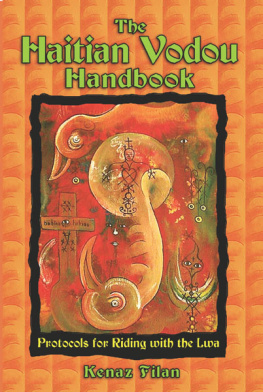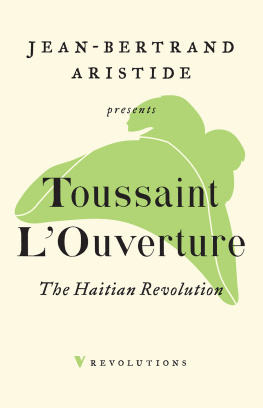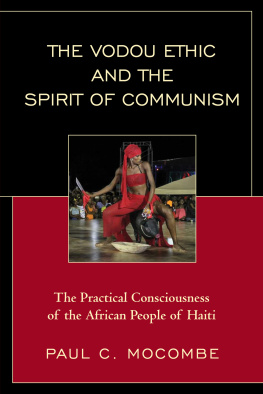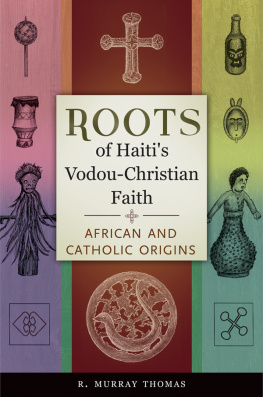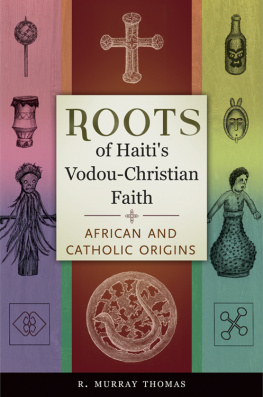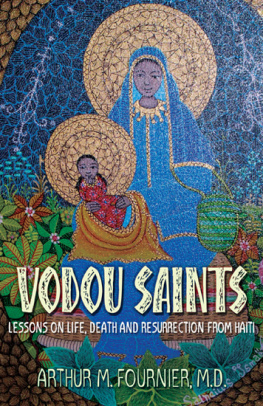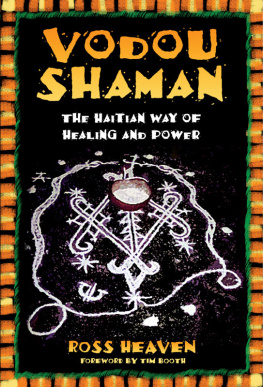No person is an island; no tree can grow without roots. Many people have helped me in my studies of the lwa. Thanks are due to Edeline St.-Amand (Mambo Azan Taye) and Hugue Pierre (Houngan Si Gan Temps), my initiatory mother and father. Kathleen Latzoni, my partner, has provided invaluable editorial assistance, organizational advice, and moral support. Anne Newkirk Niven, Dagonet Dewr, and Elizabeth Barrette, the editorial masterminds behind PanGaia and newWitch magazines, deserve thanks for believing in me and for running earlier versions of some of the material that appears in this book. Thanks are also due to Shannon McRae and Clifford Low for their assistance in proofreading an earlier draft of this manuscript, and to Reverend Samantha Kaye and the readers of her Spellmaker mailing list for their feedback and support.
PREFACE
Until recently, Vodou was more often found in pulp fiction and B-movies than in Pagan gatherings. Many Pagans bought into the stereotype and identified Vodou with devil worship, dark curses, and drumbeat-driven orgies performed at midnight. They never stopped to think that many of these charges had been leveled against medieval and Renaissance witchesand, earlier, against Jews and Christians. Some Pagans saw the saint images and the Catholic influences and wrote Vodou off as a Christian aberration; others were appalled by the animal sacrifices and by the fact that houngans and mambos (priests and priestesses) charged money for their services. Those who didnt run screaming were likely to follow the lead of Haitis Catholic clergy and dismiss Vodou as superstition and folly.
Others sought Vodou because they believed it was evil. Most were disappointed at their efforts to gain Fame, Fortune, and Endless Sex Partners and wound up trading in their voodoo fetishes for speed-metal CDs and Hammer films. A few managed to get the attention of the lwa, the spirits served in Haitian Vodou. Alas, said spirits generally were none too pleased at being treated like attack dogs or genies in a bottle, and they sometimes responded by applying the Cosmic Boot to Yon Errant Backside. This only served to cement Vodous reputation as dangerous and to attract still more Dark Mages seeking a Vodou that never existed save in the fevered imaginations of yellow journalists and movie producers.
Today, we have come to understand that many of those earlier attitudes about Vodou were rooted in racism and ignorance. Weve begun to appreciate the complexity, depth, and beauty of African and African diaspora spirituality, and many Pagans have heard and responded to the call of the lwa. It is no longer uncommon to see Ezili Freda, the beautiful lwa of love and luxury, honored alongside Aphrodite in Pagan ceremonies. Some even start their ceremonies with a small offering to Papa Legbathe lwa of the gateway who facilitates communication with the spirit worldasking him to open the door for them. Most of these people are coming to the African and Afro-Caribbean spirits with open hearts, and they are showing the lwa the love and respect they deserve. In return, they have found that the lwa have blessed them and enriched their practices and their lives.
Unfortunately, Pagans who have sought to serve the lwa on their own have been forced to deal with a scarcity of resources. Most of the literature on Haitian Vodou has been written by anthropologists and scholars, not by Vodouisants (practitioners of Vodou). Some of these books are excellent resources for cataloging the major lwa and listing some of the ways they are served in Haiti, but they dont have much information on how an individual can honor the lwa. Other books promise to teach you the ancient secrets of Voodoo power. They wont show you how to serve the spirits or tell you anything about Haiti, but they will teach you everything you (n)ever wanted to know about sticking pins in dolls, burning candles to destroy your enemies, and finding your lucky lottery numbers.
Today, many practitioners of Vodou have come aboveground. Houngans and mambos have Web sites and mailing lists, hold public ceremonies, and offer as much information as they can without violating their initiatory oaths. Unfortunately, many of these houngans and mambos speak disparagingly of Wicca-Doo and believe that one can only serve the lwa in the time-honored traditional waymeaning, of course, their way. Others will happily take you into the djevo (the initiatory chamber) and teach you their secrets for one low fee, air fare and lodging not included. A person who is an interested outsider this week can be asogwe (the highest rank in Haitian Vodou) by Sunday, if the check clears. We dont assume that everyone who does a few Yogic stretches is called to join an ashram. We dont believe that everyone who attends Mass should take Holy Orders and join a monastery. And yet many seem to think that the priesthood should be an introduction to Vodou, and not the culmination of years of involvement with the tradition; or they believe that everyone who serves the lwa must do so in a priestly capacity.
There is a Vodou priesthood, but there are also many believers and practitioners who have never been initiated but who are dedicated servants of the lwa. Some of these believers have powerful lwa who assist them in performing wanga (magic) and are well regarded as healers and magicians. Although many choose to honor the lwa at fets (public parties), there are also many who serve their spirits in the privacy of their homes. They seek counsel from the lwa, make offerings to them, and prepare shrines on their behalf without the guidance or aid of priests or initiates. If you choose to honor the lwa as a solitary practitioner, you are following in the footsteps of many Haitians.
Vodou has always incorporated material from other sources. When the slaves were brought to St. Domingue (the old French name for Haiti), they were forced to re-create their ancestral religious practices from scratch. Many of the materials they used to honor the spirits in Africa were not available in St. Domingue; often they had no access to the priests and priestesses who had led the ceremonies in their homeland. They made do with what was available and served the spirits of the native Carib and Arawak peoples alongside Catholic saints and ancestral lwa. Today, Vodouisants have incorporated some of the symbolism and practices of Freemasonry into Haitian Vodou. They have been influenced by Martinism (a French Catholic mystical/magical tradition that originated in eighteenth-century Port-au-Prince) and by the writings of the ceremonial magician Eliphas Levi. There is no reason why you cannot incorporate your own spiritual practices into your service of the lwa.
Indeed, Vodou has always demanded direct and personal involvement. Every Vodouisant puts his or her unique spin on sevis lwa (service to the lwa). Frank Sinatra, Elvis Presley, and Sid Vicious each sang My Way, and each added his own personal touch to the song so that no one would mistake one version for the other. Vodou isnt a religion where you sit back and listen to someone else talk about divinity. Its a faith where divinity comes down and talks to you. The lwa are quite happy to make their needs and their wants known to you, and to offer counsel and protection in exchange. You may not be honoring them the way they are honored in Haiti, but so long as you are honoring them, they will notice and will show their appreciation.

